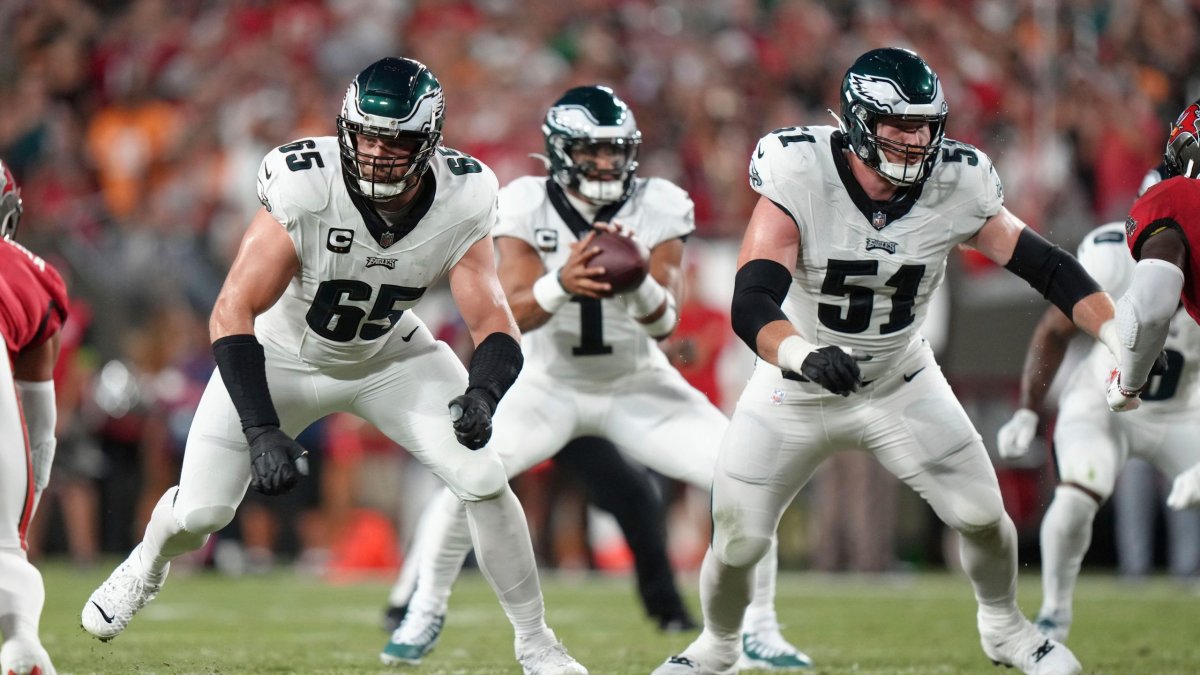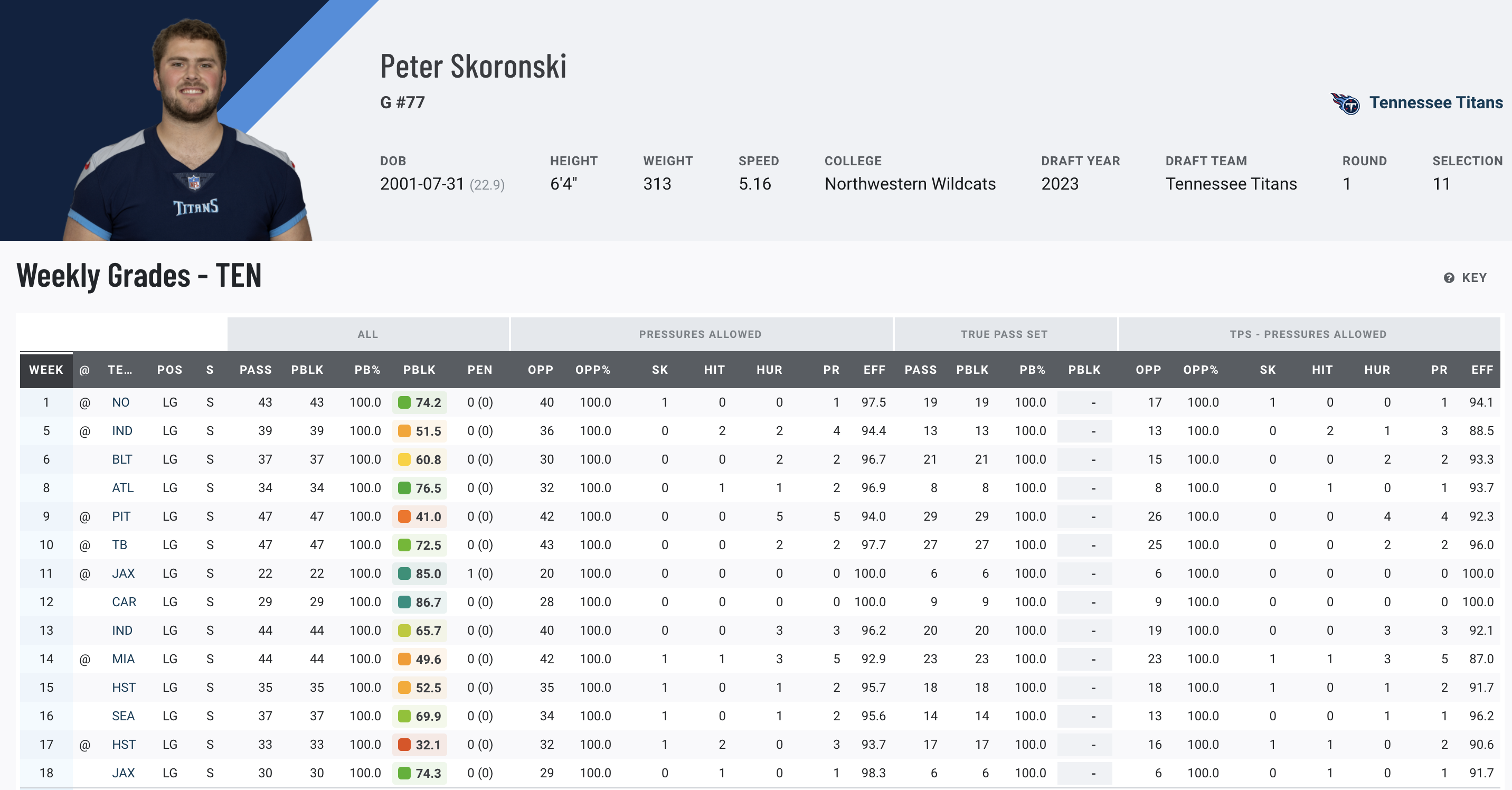


• Rasheed Walker has already defied expectations: Walker has outstanding size (6-foot-6 and 324 pounds) and posted just two below-average PFF game grades as a pass blocker in his first season as a starter.
• The heir-in-waiting: Jason Kelce retired this offseason, paving the way for Cam Jurgens to finally assume the position he is best at. Jurgens played over 700 snaps for the Eagles at right guard last season, but at a little over 300 pounds, he was always projected to play center at the next level.
• Get a head start on fantasy football: Use PFF’s fantasy football mock draft simulator to create real live mock draft simulations to prepare for your live draft!
Estimated reading time: 7 minutes
Offensive linemen often take a year or two to hit their full stride and become the players they are destined to be at the highest level. In this article, we’ll highlight some of the most promising breakout candidates and what we have seen from them so far in their careers.
Perhaps the most under-the-radar candidate on this list, the seventh-round pick from the 2022 NFL Draft earned the starting job for the Packers last season. Early in training camp, he looked like a major work in progress but earned a solid overall grade of 66.3 and was particularly good in pass protection (74.7) in his first year of starting action.
The Packers drafted a tackle in the first round of the 2024 NFL Draft — Jordan Morgan out of Arizona — but they have a history of drafting college tackles to play guard at the next level. Morgan could theoretically push Walker for the starting spot at left tackle, but he could just as conceivably kick inside to play guard, leaving Walker to develop in his second season starting.
Walker has outstanding size (6-foot-6 and 324 pounds) and posted just two below-average PFF game grades as a pass blocker in his first season as a starter. He will be very good next season if he can continue his progression. If he can improve his run-blocking, he could become outstanding.
By any measure, Braxton Jones has dramatically exceeded expectations in the NFL. A former fifth-round draft pick, Jones has been a starter for the last two seasons and has been solid in all areas.
However, he didn’t improve in his second season, and players who are merely “solid” often quickly become seen in terms of their deficiencies rather than their strengths.
Jones wasn’t helped by the play of Justin Fields, even if he was occasionally bailed out on individual plays. Fields could certainly escape the occasional quick pressure, but he was also the architect of a lot of pressure and held onto the ball longer than any other player in the game, stressing the protection in front of him.
With a new quarterback behind him, Jones may look significantly better in Year 3 and will hopefully be healthy once again, showing a true ceiling of what he can become at this level.

Smart teams draft for the future rather than immediate needs.
The Eagles drafted center Cam Jurgens in the second round of the 2022 NFL Draft to be an heir-in-waiting to future Hall of Fame center Jason Kelce.
Kelce retired this offseason, paving the way for Jurgens to finally assume the position he is best at. Jurgens played over 700 snaps for the Eagles at right guard last season, but at a little over 300 pounds, he was always projected to play center at the next level.
At guard, he was a solid run blocker with some very iffy games pass-blocking, but at center, he will have regular help on either side of him in that regard, and that run-blocking prowess will only be emphasized.
He was always seen as Kelce’s natural successor inside, and 2024 is the first year he will have that opportunity.
An elite left tackle in college, many projected Skoronski as a guard at the next level, including the Tennessee Titans. Typically, guards are drafted significantly lower than their tackle counterparts. Yet, despite that projection, the Titans still spent the 11th overall pick on Skoronski, giving some indication that they believe he can be special inside.
His rookie year was only solid at best, but his best game was his season debut before he had an appendectomy and didn’t return until Week 5. That downtime caused him to lose size and strength in-season, and he never really had much opportunity to rebuild it before he was needed again. He essentially had to deal with adjusting to a new level, at a new position, undersized and understrength because of appendicitis.
Year 2 will give us a much fairer indication of what Skoronski can be, even if the team elects not to give him a try at left tackle and keeps him inside at guard.
As a rookie, he surrendered 32 total pressures from 521 pass-blocking snaps but did have several impressive single-game performances, including the one game he featured in before appendicitis.

Paris Johnson Jr. is currently walking the typical young offensive tackle development pathway. A left tackle in his final college season, he was moved to the right side for his first NFL season and will now move back to the left side in Year 2 because of the departure of D.J. Humphries.
Young tackles are also often better as pass blockers than they are as run blockers early in their NFL careers, as counterintuitive as that can be.
Johnson earned a PFF pass-blocking grade of 64.2 as a rookie, almost 10 grading points better than his performance in the run game. He allowed 42 total pressures but produced six PFF game grades of at least 74.8 in pass protection and improved as the season progressed.
If he continues the typical offensive tackle development pathway, Johnson is primed for a big jump in performance in Year 2 and could become one of the better young tackles in the game for the Cardinals.